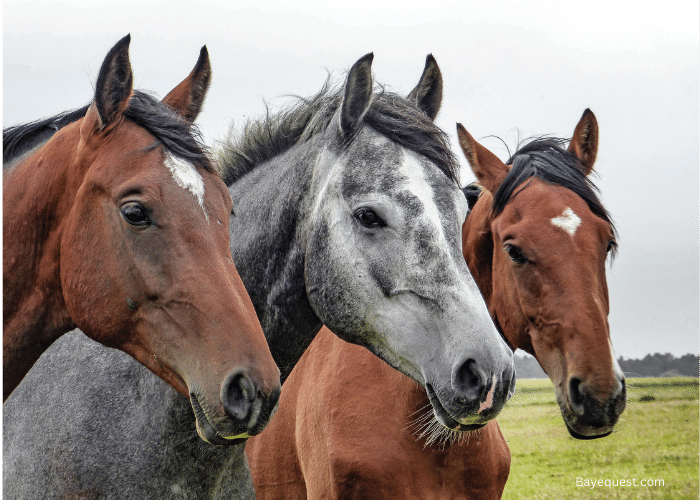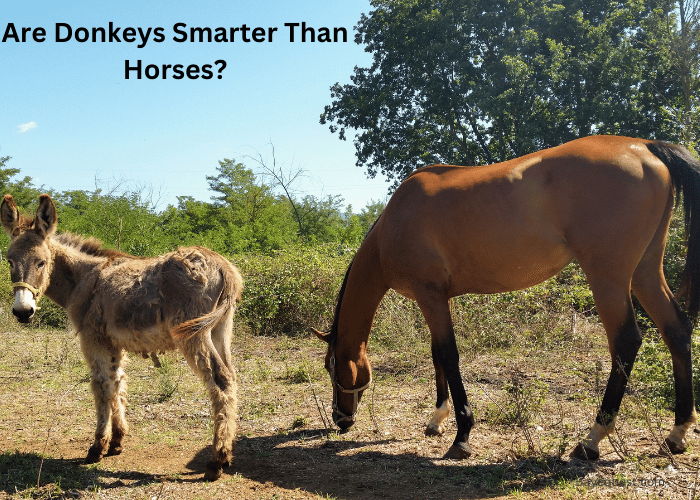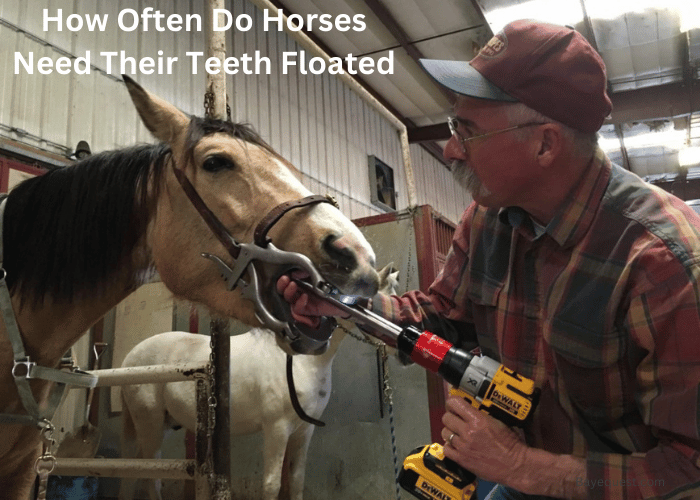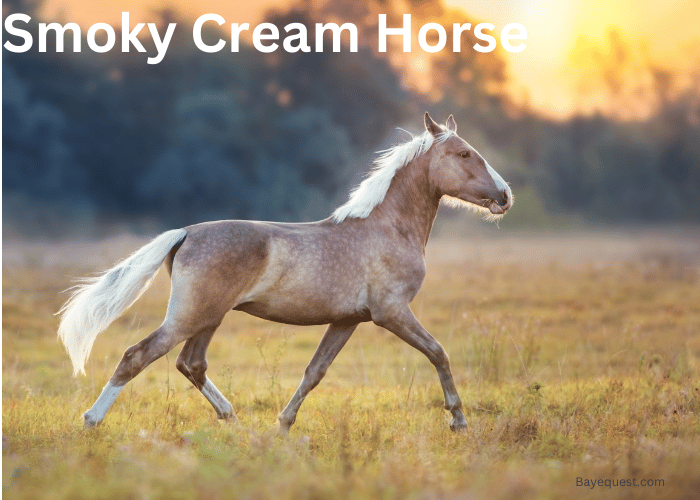Picture yourself in the presence of horses, feeling their power and sensing their silent understanding. But have you ever wondered what makes each horse unique?
We’re diving deep into the world of horse personality, where each equine has a distinct character. From bold leaders to gentle giants, horses come in all shades of personality.
Let’s uncover the secrets behind their behavior together. Join us as we explore what shapes their personalities and how we can better understand them.
Ready to embark on this adventure? Let’s saddle up and unravel the mysteries of horse personality together.
What is Horse Temperament?
Horse temperament is basically their nature – how they act and react to things. It’s like their personality, you know?
Some horses are super chill, while others are more feisty. It’s all about how they handle different situations and their overall vibe.
Understanding a horse’s temperament is key to working with them and keeping them happy and healthy. So yeah, it’s like getting to know their vibe and figuring out how to vibe with them.
Main Horse Personality Types
The following are the 4 main types of horse personalities:
Social
Social horses are like the life of the party in the horse world. They’re the ones who love to hang out with other horses, always seeking that company.
Being naturally outgoing, they often make it easy for humans to bond with them, too. The good part is they tend to be friendly and cooperative, making them great for activities like trail riding or group events.
However, because they’re so social, they might get anxious when left alone, and sometimes, they can be a bit too nosy or bossy with other horses.
Fearful
These are the sensitive souls of the equine world. They are easily spooked by anything unfamiliar.
You’ve got to approach them with a gentle touch because they’re quick to panic if things get too overwhelming.
On the upside, they’re incredibly loyal and devoted partners once they trust you. They’ll go to great lengths to avoid scary situations, which can benefit their safety.
However, their fearfulness can sometimes prevent them from trying new things or exploring their full potential.
Read also: What is the fear of horses called?
Aloof
These guys are a bit more independent and reserved, kind of like the lone wolves of the pasture. They might not be as eager for attention or affection as other horses, preferring to keep to themselves.
But don’t let their standoffish demeanor fool you. Once they form a bond with someone, they’re fiercely loyal and reliable.
They’re also pretty good at staying calm and level-headed in stressful situations. However, because they’re not as outgoing, earning their trust and friendship might take a bit more time and effort.
Challenging
These people can be a handful. They always seem to be pushing boundaries and testing limits, so dealing with them requires patience, consistency, and firm boundaries.
On the bright side, once you establish that trust and respect with them, they can be incredibly rewarding partners. They’re often intelligent and full of personality, which can make for some interesting rides.
But be prepared for some ups and downs along the way as you navigate their strong-willed nature.
Other Horse Personality Types
Distrustful
Distrustful horses are cautious, always keeping their guard up and wary of new people or situations. It takes time and patience to earn their trust, but they can be incredibly loyal companions once you do.
However, their wariness can sometimes lead to challenges in training or handling. They may be hesitant to try new things or follow commands.
Sensitive
These are the ones who wear their hearts on their sleeves. They react strongly to even the slightest change in their environment or your mood.
While their sensitivity can make them incredibly responsive and attentive partners, it also means that they require a gentle touch and a lot of understanding.
They thrive on positive reinforcement and can excel in disciplines that require nuanced communication between horse and rider.
Easy going
The easy-going horses are laid-back characters. They are like the Zen masters of the equine world, taking everything in stride with a calm and relaxed demeanor.
They make you feel at ease as soon as you’re in their presence, and they’re often sought after for their steady and predictable nature.
However, their easygoing attitude can sometimes border on laziness, requiring some motivation to get them moving.
Grumpy
Now, let’s talk about the grumpy horses. These are the ones who always seem to have a chip on their shoulder, with a perpetual frown etched on their faces.
They can be a bit cantankerous at times, quick to pin their ears back or give you the stink eye. Dealing with them requires a delicate balance of assertiveness and empathy.
Pleaser
These are the ones who live to please their humans, always eager to do whatever it takes to earn praise and affection. They’re the teacher’s pets of the barn and thrive on positive reinforcement and clear direction.
While their desire to please can make them easy to train and handle, ensure they’re not overworked or taken advantage of, as they may put their needs aside in their quest for approval.
The Passive to Aggressive Factor Within Each Type
Each horse’s personality type can show a range of passive to aggressive behavior.
Social horses tend to be more passive, enjoying the company of others and avoiding conflict. However, they may assert themselves in some situations to maintain their place in the herd hierarchy.
Fearful horses often lean towards the passive end of the spectrum, as they’re more likely to flee than fight when faced with a perceived threat. However, if pushed too far, they may react aggressively out of fear.
Aloof horses can be passive or aggressive, depending on their temperament. Some prefer avoiding confrontation altogether, while others assert themselves more to protect their personal space.
Challenging horses are more likely to exhibit aggressive behavior. They may push boundaries and challenge authority figures. With consistent training and clear boundaries, their aggression can be redirected into more positive outlets.
Distrustful horses may exhibit passive-aggressive behavior, such as avoiding interactions or subtly resisting commands. They may also lash out aggressively if they feel threatened or cornered.
Sensitive horses may lean towards the passive side, as they’re more likely to react with fear or anxiety rather than aggression. However, they may react aggressively to protect themselves if they feel overwhelmed or overstimulated.
Easy-going horses are typically more passive, as they tend to go with the flow and avoid conflict whenever possible. However, if pushed too far, they may assert themselves more aggressively to establish boundaries.
Grumpy horses may exhibit passive-aggressive behavior, such as pinning their ears back or swishing their tail when they’re feeling irritated. However, if provoked, they may escalate to more overtly aggressive actions.
Pleaser horses are generally more passive, as they’re eager to please and avoid conflict whenever possible. However, if they feel overwhelmed or overworked, they may become more assertive in expressing their needs
Factors Influencing Horse Personality
Several factors influence horse personality. These include:
Genetics. Just like in humans, genetics play a significant role in shaping a horse’s temperament and personality traits.
Early life experiences. The experiences a horse has during its formative years can have a lasting impact on its personality. Positive experiences can result in a confident and well-adjusted horse, while negative experiences can lead to behavioral issues.
Training methods. The techniques used to train a horse can influence its personality and behavior. Positive reinforcement methods that focus on building trust and confidence tend to produce more willing and cooperative horses. Harsh or inconsistent training methods can lead to fear, anxiety, or aggression.
Social environment. Horses are social animals. Their interactions with other horses and humans can shape their personalities. Horses that are raised in a herd environment and have positive social interactions tend to be more sociable and well-adjusted.
Individual temperament. Horses have individual temperaments. Some horses are more outgoing and sociable, while others are more reserved or independent.
Health and wellness. Physical health and wellness can also impact a horse’s personality. Pain or discomfort from health issues can cause a horse to become irritable or aggressive.
How to Determine Your Horse’s Personality
To figure out your horse’s personality, pay attention to how they act in different situations. Notice if they’re outgoing and friendly or more reserved and independent.
Watch how they interact with other horses and people, and note whether they’re confident or easily spooked. Also, note their reactions to new experiences and challenges.
Spend time grooming, riding, and hanging out with them to get a sense of their temperament. And don’t forget to trust your gut – sometimes, your intuition can tell you a lot about your horse’s personality.
Which Horse Personality is Best for Me?
Choosing the right horse personality depends on what you’re looking for. A social horse might be perfect for you if you want a companion who’s always up for a good time and enjoys being around others.
If you prefer a more laid-back partner who’s steady and reliable, an easy-going horse could be a great fit.
On the other hand, if you’re up for a challenge and enjoy working through obstacles together, a challenging horse might be just what you need.
It all depends on your preferences, riding style, and the kind of relationship you want to build with your horse.
Practical Implications of Horse Personality
Understanding your horse’s personality has real-life impacts. It helps you pick the right training methods and care routines.
Matching your personality with your horse’s makes for smoother rides. Plus, it’s handy for spotting and fixing any behavior issues early on.
When you know your horse well, you can build a stronger, more trusting bond. So, paying attention to personality isn’t just about vibes. It’s about practical horse care and happy riding.
It also guides decisions about turnout, socialization, and even selecting the right companions for your horse. With this insight, you can create a supportive environment that suits your horse’s needs and preferences.
FAQs
How do horses act when they are happy?
When horses are happy, they often exhibit relaxed body language, such as soft eyes, ears forward or relaxed, and a relaxed posture. They may also engage in playful behavior, such as prancing or rolling in the grass.
Read also: Equine body language.
How do horses show anger?
Horses may show anger through various signs, such as pinning ears, swishing tails, stomping feet, baring teeth, or even kicking and biting. They may also try to assert dominance by challenging other horses or people.
How do horses show that they are sad?
Horses show signs of sadness through behaviors like lethargy, drooping head or ears, reduced appetite, and withdrawal from social interactions. They may also exhibit signs of stress or depression, such as pacing or cribbing.
How do horses show respect?
Horses show respect by displaying submissive body language, such as lowering their head, backing away, or yielding space to other horses or humans. They may also respond to cues or commands promptly and willingly.
How do horses express their love for you?
Horses express their love for you through various behaviors. These may include seeking out your company, nuzzling or grooming you, and following you around. They may also show signs of relaxation and contentment when in your presence, such as sighing or resting their head on you.
Conclusion
So, as we finish up, remember every hoofbeat tells a story, and every flick of the tail reveals a glimpse into the soul of these magnificent creatures.
Whether your horse is a social butterfly, a sensitive soul, or a bit of a challenge, embrace their uniqueness and cherish the bond you share. By understanding and appreciating their individual personalities, you open the door to a world of richer connections.
So saddle up, ride on, and let the magic of horse personality guide your path.










